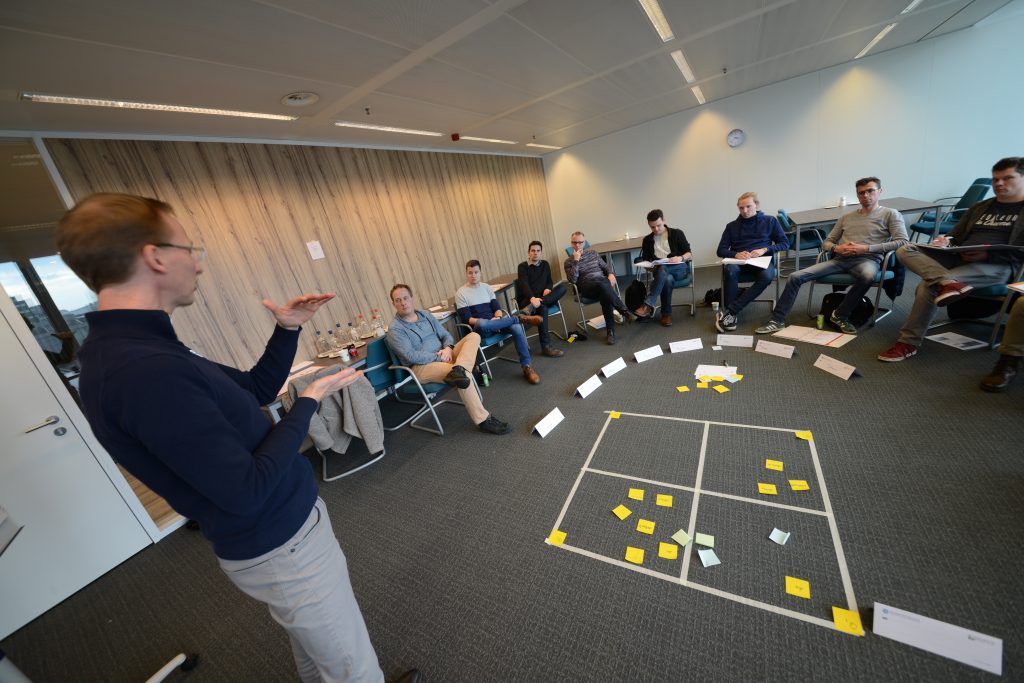Bram Bergen (Adimec)
Distractions and disruptions are the enemies of work efficiency. To push through and keep your daily tasks on track, time management skills are a necessity. Looking for tools and tips to enhance your workplace efficiency? High Tech Institute’s “Time management in innovation” training has you covered.
Despite the economic slowdown brought on by the Covid-19 pandemic, many businesses are finding that productivity has increased, as we’ve completely altered the way we operate. While working from home might mean no travel time and a more relaxed start for some, others are finding themselves behind the computer morning, noon and night. Combine that with the incessant flow of disruptions ranging from instant messages, e-mails and calls to pets, people and package deliveries – sometimes it feels like there just aren’t enough hours in the day to get everything done.
The good news is, it doesn’t all have to be done at once, and a little prioritization and good time management can make all the difference in the world. But, just like any of the technical skills you display in your work, this particular set of skills also needs to be developed. Enter: High Tech Institute’s “Time management in innovation” training – aimed at providing engineers and innovators with the tools to help relieve stress and enhance workplace efficiency.

Bram Bergen, software development engineer at Adimec.
Sooner rather than later
“All at once, I found myself sitting in several different difficult projects, feeling stressed to get everything done,” explains Bram Bergen, software development engineer of Adimec Advanced Image Systems – a specialist in developing high-performance industrial camera systems used by global OEMs, system integrators and government contractors for three main market segments: machine vision, medical and global security applications. “We develop customized cameras for a wide assortment of applications, but that means we have to tailor our cameras to the customer’s specific needs while maintaining ruggedness and reliability.”
To meet those stringent expectations, Bergen works closely with Adimec’s development, production and prototyping teams to build test software to put these cameras through extreme challenges like temperature, vibration and calibration tests. However, as orders and projects continued to pour in, Bergen started to notice he was being spread thin, as the work piled up.
'I wanted to see how I could get more organized and keep from forgetting things on my growing list'.'
“That’s when I decided I wanted to enroll in the course. I still felt like I was at a place where I could handle everything, but as soon as it all started to run together and overlap, I knew it would be trouble. That’s why I opted to take the course sooner rather than later,” explains Bergen. “My goal was to get some tips and tricks on how to get more structure in my work and how to create more time for focused work throughout my day. But also, I wanted to see how I could get more organized and keep from forgetting things on my growing list.”
Time registration
Part of the growing problem for Bergen, as many can relate, is that he was traditionally a yes-man. His ambition to help his team thrive meant that he would take on nearly any task he was asked for, and all of them became a priority. “I always had the feeling that I had to spend my time immediately replying to e-mails and Skype messages because they were very important – my colleagues were depending on me and needed me. But in doing that, I was continuously distracted, which lead to working overtime to get everything finished,” describes Bergen. Clearly, this way of working wasn’t sustainable. “What I really needed was to learn some techniques to take control of my agenda and prioritize my work.”
'Your brain is interrupted and forced to switch directions – a well-known killer of working efficiency'.'
This became even more clear when Bergen completed the daily time registration exercise for the course, which asks you to log your entire workday – every call, every e-mail, every minute spent on focused work, all of it. The goal: to show you how many times your brain is interrupted and forced to switch directions – a well-known killer of working efficiency.
“There were a lot of good lessons to be learned in the training, some new and some old, but the time registration was really an eye-opener for me. In one day of logging, I counted some 60 switches – and that felt like an easy day without a lot of disturbance,” illustrates Bergen. “That’s when I really started to realize the number of interruptions I was getting every day. Answering an e-mail, now someone’s calling, oh, here’s a colleague at my desk, there’s Skype again. That’s when it all sort of clicked. Maybe I don’t have to respond to everything immediately.”
Decline
Here Bergen saw an opportunity to really employ some of the tactics he learned in the course like blocking time out of his calendar to focus more on projects, declining meetings that weren’t absolutely necessary and minimizing distractions. “I found that turning off notifications for Skype and e-mail was crucial for me. I first tried to leave them on in the background while I worked, but it really proved to be a distraction,” says Bergen. “The truth is, making my colleagues wait a little while before responding, so I could focus on my work, really wasn’t a problem for anyone. If it was really important, they’d just call or walk by.”
One of the biggest things Bergen walked away with is that it’s important to think about himself a little more. “In the past, family and colleagues would give me instructions on how to balance my time, but I didn’t understand their reasoning behind it. Now, I feel like this course really gave me insight and reasoning as to why that’s so important,” expresses Bergen.
“Because of that, I now make sure to plan time for myself. If one week is extremely busy and I start feeling tired, then I try to take it a little easier the next week or take a long lunch and go cycling to clear my head. By using some of the tools we got from the training at High Tech Institute, I find I’m much more structured and organized in my work and it feels like I’m getting more done with much less stress.”

During the time management training, theory is immediately put into practice.
This article is written by Collin Arocho, tech editor of Bits&Chips.
Recommendation by former participants
By the end of the training participants are asked to fill out an evaluation form. To the question: 'Would you recommend this training to others?' they responded with a 9 out of 10.

